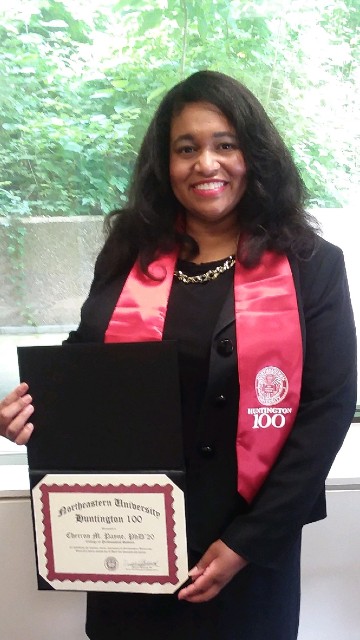If not for the coronavirus, Cherron Payne (CPS 20’) might be packing her bags right now for an international service project on behalf of the U.S. State Department.

Dr. Payne, who earned her Doctor of Law and Policy degree from the College of Professional Studies, was recently accepted into the Fulbright Specialist Program. This prestigious initiative sends out 400 U.S. faculty and professionals every year to “serve as expert consultants on curriculum, faculty development, institutional planning, and related subjects,” at academic, cultural, and non-governmental institutions for a period of two to six weeks, according to the program’s website.
“It could be a variety of assignments,” said Dr. Payne about her prospective Fulbright Specialist project. “It could be teaching, starting a legal studies program, or serving as a consultant to either an academic or cultural institution. I may even be able to perform work aligned with my dissertation.” Her dissertation, for which Professor Bobby Hazelton served as her adviser, examined judicial reform and court operations
While COVID-19 has put her Fulbright plans on hold for the foreseeable future, Dr. Payne already has plenty to keep her busy. She has operated her own law practice –Farmington’s ACP Law Firm, LLC – since 2010 and has been a magistrate in Connecticut for nine years. In 2016, former Connecticut Governor Dan Malloy appointed her to chair the state Commission on Human Rights and Opportunities, the oldest state civil rights agency in the country. She has also worked part-time as a Contract Specialist for the University of Connecticut Health Center for the past decade.
It’s all in keeping with Dr. Payne’s lifelong pursuit of achievement, which has included playing the viola in the Colchester Civic Orchestra, earning a black belt in taekwondo, and founding the Global Motion Dance Company.
The most recent achievement Dr. Payne can celebrate is her selection as one of this year’s Huntington 100, the Northeastern program that recognizes students who have recorded achievements in research, co-op, athletics, entrepreneurship, community service, and leadership. Nominated by faculty, staff, advisors, coaches, employers, and fellow students, Dr. Payne and her fellow honorees were selected from a field of 750 nominees by a panel of Northeastern judges.
Born and raised in Toledo, Ohio, Dr. Payne attended Ohio University and graduated summa cum laude from its Honors College with a B.S. in Communications before going on to Harvard where she was awarded the Graduate Prize Fellowship and earned a master’s degree in the History of Science.
“In between each step I worked as a biological researcher and interned at CNN, and then I went to law school at Vanderbilt,” she recalled. After receiving her JD from Vanderbilt University Law School, Dr. Payne worked at a Nashville law firm for a year while earning an advanced diploma in History with honors from Oxford University.
Relocating to Connecticut in 2006, Dr. Payne served as corporate counsel for a time before launching her own practice focused on business law, litigation, housing law, contract negotiation, and entertainment law. Her interest in pursuing a doctorate in Law and Policy grew out of her work experience.
“I felt earning a doctorate was a natural step for a couple reasons,” she said. “I wanted to build on my practice as an attorney and broaden my horizons to open some other avenues. I wanted to strengthen my academic background in policy. I’d been doing some policy work as a State Commissioner – for example, reviewing and approving the Affirmative Action policies for state agencies – but I really wanted to obtain a more solid foundation in policy. I also felt that pursuing the Doctor of Law and Policy degree would create more opportunities for me to venture into policy work in addition to my legal career.”
Dr. Payne’s search for a suitable degree program was a short one.
“I gravitated to Northeastern right away because it was the only program that offered the duality of law and policy – where it wasn’t just law and wasn’t just policy,” she said. “I felt that duality would present more than one option for me to further my career.”
“I also liked the hybrid construction of the program, where you have class time and you do get to meet your classmates, but you do not have to be in class all the time as you would in a traditional PhD program,” Dr. Payne continued. “It’s catered more toward working people.”
Her fellow students have been a highlight of the experience.
“It’s been great to share the program with my classmates, who are from all throughout the United States and from very different fields and industries,” she said. “It’s very enriching because you get different perspectives. And we’re still in contact with each other, even as a group. So it’s been wonderful to have that camaraderie. I’ve learned a lot from being around people who are engaged in public administration, cybersecurity, academics – we even had a student who worked in the White House. So it was great to have that diversity. Another thing I did like about the program is my study-abroad experience. We went to London and studied comparative health policy. It was brief but it sparked my interest in pursuing other international experiences.”
“Looking ahead, I have two aspirations,” Dr. Payne said. “I would like to become a practitioner-scholar, and I would like to get more involved with international policy.”
The first step will be the Fulbright Specialist program, which has extended the time period available for Dr. Payne to select and complete her project by over a year as the impact of the pandemic continues. She’s hopeful it won’t be long.
“There was one opportunity I found right before COVID-19 struck the U.S.,” she said. “There was an academic institution in India that was looking for a Fulbright Specialist to start a legal studies program. That’s an example of a program in which I may be interested.”